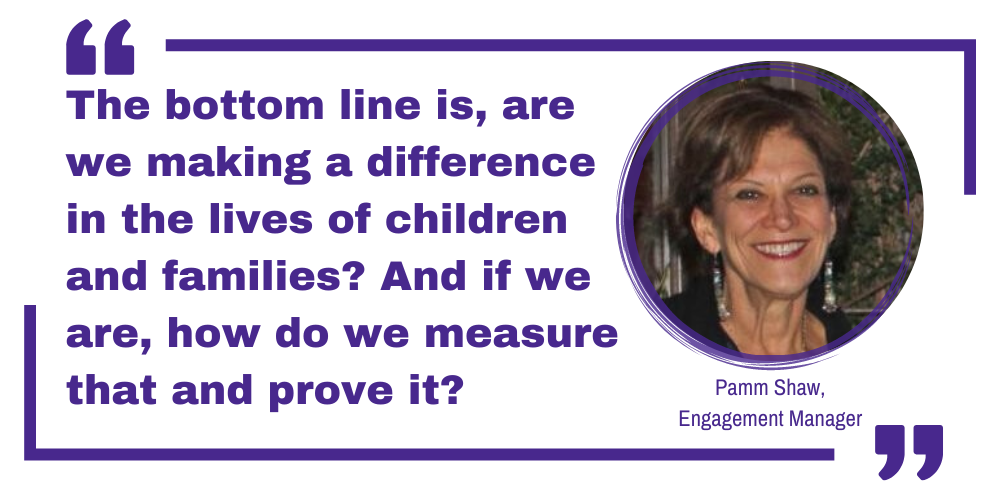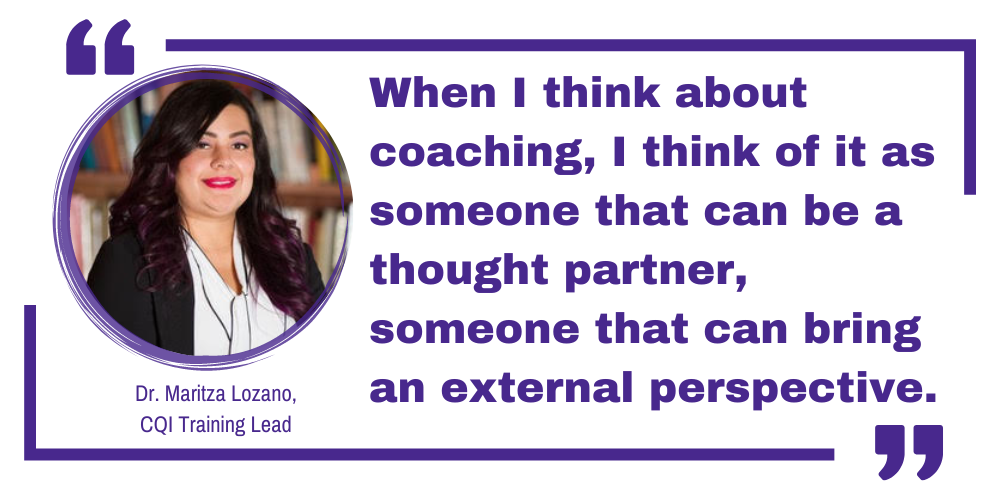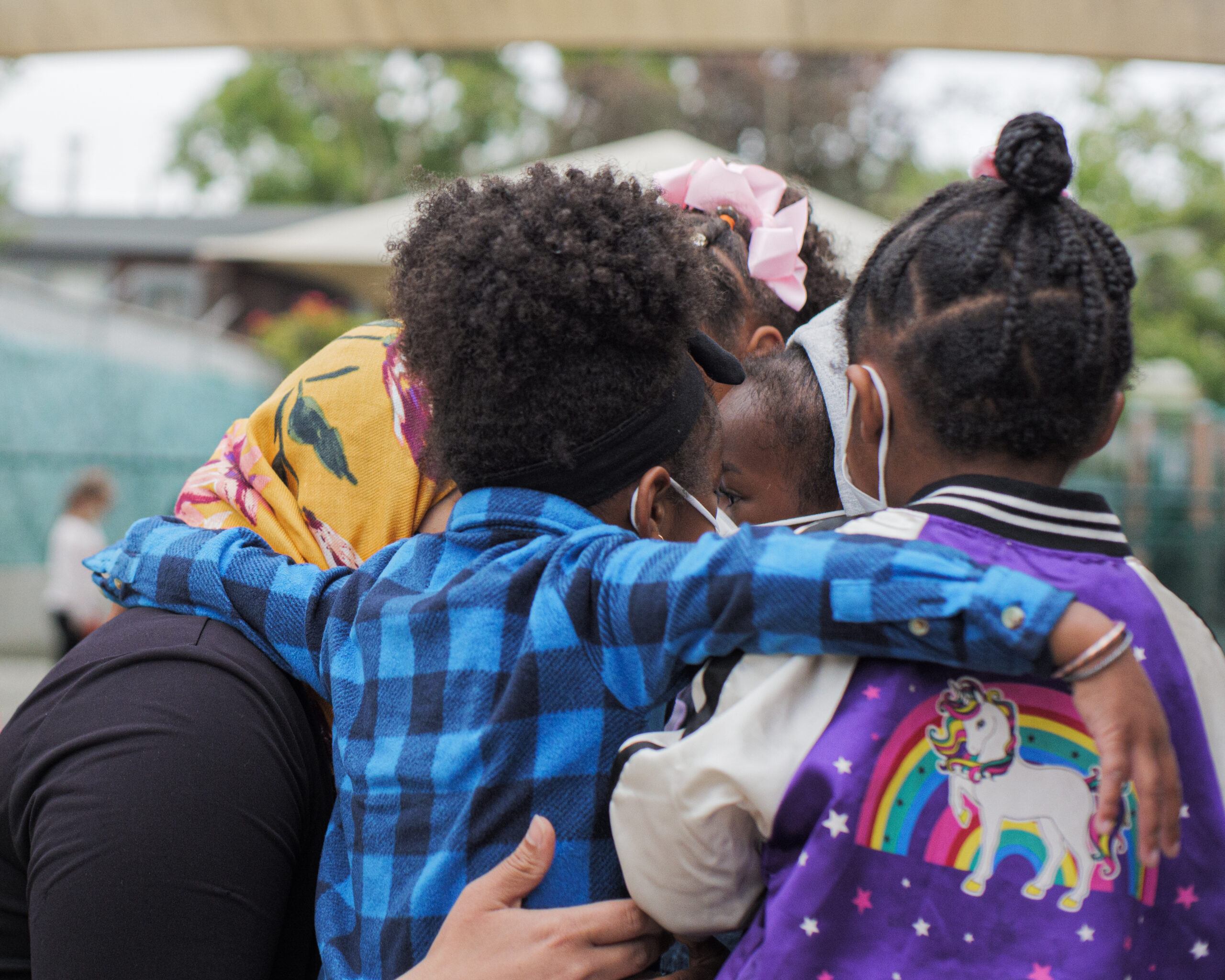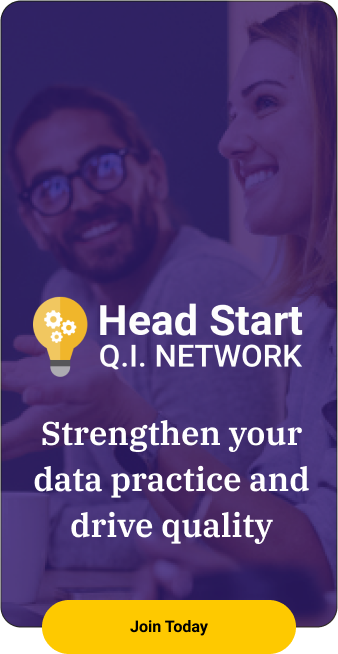We sat down with two QI Network coaches over Zoom to find out how they got into coaching, why they’re passionate about continuous quality improvement (CQI), and how this work helps Head Start programs.
Dr. Maritza Lozano (CQI Training Lead) is an Assistant Professor in the Educational Leadership Department at California State University, Fullerton. She brings 25+ years of professional experience working with school communities across the United States. She earned her Ph.D. in education from the University of California, Los Angeles and hold an M.A. in Education with an emphasis in Reading, K-12, from California State University, Los Angeles and a B.A. in Spanish Literary Studies from Occidental College.
Pamm Shaw (Engagement Manager) was Head Start director for the last 18 years for the YMCA of the East Bay in Berkeley, California. She’s now Director of Strategic Funding and Partnerships, which involves helping prepare for federal reviews, doing grant applications, keeping the early educator apprentice program operational and funded.
The following conversation with Lozano and Shaw has been lightly edited for clarity and brevity.
What inspired you to get into improvement science?
Maritza Lozano: Even before I started graduate school, I started my career as a bilingual elementary school teacher in Los Angeles Unified School District. In that position, I couldn’t help but notice variation between what I expected to see and what I was actually seeing. I was in the classroom for a short time, because I quickly got tapped to become an instructional coach.
I’d only been in the classroom for a little under five years, and most of the people that I coached had been teachers for over 20 years. I coached at the same school where I taught, at a really large elementary school. There were over 100 teachers, and I was responsible for coaching half of them. I did that for three years.
Towards the end of my third year coaching I was approached by the district team with the opportunity to become a district-level literacy content expert. I joined the district-level team and that’s when I started working with different schools. This idea of seeing variation and also seeing how people do things differently is what initially drew me to improvement science. It was a methodology that privileged the expertise of everyone who’s part of the team and it recognizes that teachers and educators and practitioners have expertise that is needed. And it shines a light on the importance of systems in producing the outcomes we see.
Pamm Shaw: My route is a little bit different. I’m a practitioner, I came through working in Head Start programs for years and had been a director in two programs. As a Head Start practitioner, we’re always creating answers, but not necessarily to the right questions or the right problems. We may be fixing one thing, that may make a difference or may not.
Head Start always required data collection but only in the current regulations is the emphasis on using data to inform decision-making in all program areas, making our thoughts about data more organized and sequential. For me, the bottom line is, are we making a difference in the lives of children and families? And if we are, how do we measure that and prove it?

I was managing a teacher training program, and our data is all over the place. We talk to the participants, we hear their stories, and it’s life changing. But how do we know we are really making that kind of a difference? Are people staying in the field or working in early childhood as a result of our program? This is the stuff we’re looking at right now. We’re being evaluated this year, so it’s a good year to look at it. But I think quality improvement is ongoing and it’s day to day, rather than doing a one-time evaluation and looking at a point in time.
I love working with Maritza, because she’s not immersed in Head Start. She’s not thinking every day about recompetition or writing grants or compliance with federal regulations. She’s able to shine a spotlight on a different reality and ask the right questions. We’re so involved in what we do on a day-to-day basis, we don’t have time to think about things in different ways or step away and reflect on the data.
What do you love about coaching?
Pamm Shaw: For me, it’s that “aha!” moment when you’re working with a team. I had this experience with one of our teams where they got it. They understood that it was like that moment of change where you could see a shift.
Maritza Lozano: It represents, for me, such a paradigm shift. It’s such a different way of approaching work. I feel like groups or teams are used to planning their way to outcomes. They’re monitoring but not in the ways that we’re trying to get them to monitor and at the same time, not including the perspectives of other people in ways that will really get them to move forward and make progress.
Would each of you walk us through a typical day for you?
Pamm Shaw: I sort of shift back and forth in terms of what I do. I try to balance it out, so no one day looks the same to me. You will not find a day in my calendar that looks like the next day. You’ll see Zoom meeting, Zoom meeting, Zoom meeting, now we’re starting to do some more in person stuff.
My day is between group meetings and individual stuff and planning things and writing grants. And then I’ll take out some time and do some Early Intel stuff here and there. It’s maybe 10 or 12 hours a month, and it’s concentrated. I usually try and stick to Mondays and Fridays for Early Intel and limit work my other job on those days.
Maritza Lozano: It’s very similar. My primary job is as an assistant professor at Cal State, so that requires a lot of time dedicated to teaching, to scholarship, and to service. Sometimes I’m preparing for classes. I do a lot of co-teaching which is both fun and a lot of work. It requires that I collaborate with my co-instructors. A lot of the work that I do in my research involves partnership work, which means that I’m also collaborating with district leaders, or I’m collaborating with other researchers.
I spend time collaborating with folks, I spend time working on my teaching, I usually have at least a few service things that I need to do. But every day looks different.
Pamm Shaw: That’s a good thing, actually, because I would get really bored if every day were the same. I like the diversity of the meetings that I’m in and the different kinds of work that I’m doing.
What should Head Start program leaders know about working with a coach?
Maritza Lozano: When I think about coaching, I think of it as someone that can be a thought partner, someone that can bring an external perspective. It’s almost like someone being able to hold up a mirror to you to help you reflect on your work and your program.

Pamm Shaw: It’s asking questions that you may not ask yourself or have time to think about. The reflective part is really important for a coach. We’re not there to tell people what to do, but to help them find the answers themselves, and give them the tools to help them on their journey.
What do you think is the biggest challenge for a Head Start program taking on CQI?
Pamm Shaw: Their willingness to be vulnerable, and to shed some of their weaknesses and to expose themselves to knowing they’re not perfect. No program is perfect, and we all know that. But you’re asking your staff what they think about you. You’re asking parents what they think about you. You’re exposing things that you may not want, or think you want, until you hear the information. And it’s like “wow, why didn’t I ask this question 10 years ago?” So, I think there’s a vulnerability, and there’s a strength in being vulnerable for programs.
Maritza Lozano: It forces people to work in teams, maybe differently than they’re used to. It can be difficult because there’s a culture of compliance, and there are serious ramifications. Making sure that you make time to engage in this work can be challenging but so rewarding.
Can you share any success stories? Any improvements or “aha!” moments that you’re especially proud of?
Pamm Shaw: There have been so many. Every single team that I’ve been privileged to work with, has had an experience that changed how they do what they do. Kitsap Community Services changed their enrollment process to be more family-friendly. Pacific Clinics looked at their family engagement during COVID and saw that they were doing some things that at first, they thought was about technology and family engagement. Then they realized it was about the times that they offered their training sessions for parents, because parents were busy with their school-aged kids.
Maritza Lozano: I’m trying to convince the team that this is a good approach, and then hearing the team or the director be a champion for this work is a great moment. When you hear the director talking about their experience and how valuable it is, that’s affirming. Being able to impact programs has been a powerful experience.
Anything else you’d like readers to know about CQI or the QI Network?
Pamm Shaw: The work is transformative. It brings teams together in ways that they didn’t think that they could be together. When they get together, and they form their data team, they look at things differently. When they use their data dashboards for federal reviews or to present to their board of directors and their Head Start parent groups, it’s really powerful.
Maritza Lozano: This is work that can really support the decisions that you make programmatically. It should really be used and can be used to make justifications for why you’re taking particular actions. It can be supportive in terms of reflecting how you are reaching out to families, how you are involving your staff, how everyone’s voice is represented in the work that you’re doing, and the actions that you’re taking to meet your target goals and outcomes.
Pamm Shaw: The other thing that it brings up is the roles of leadership and programs. It’s often not the director who takes the lead on this. So, you see other members of the leadership team stepping up in ways that give them a different perspective on their role in the agency. That’s really powerful when you see this happening.


